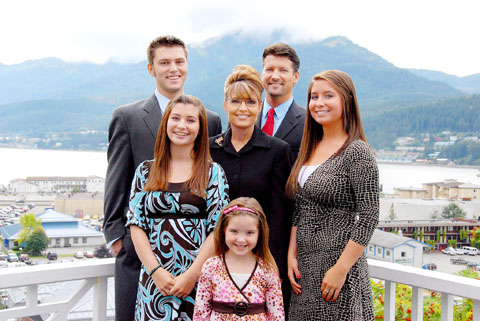A flurry of personal and legal revelations battering Republican vice presidential nominee Sarah Palin yesterday raised new questions about Senator John McCain’s risky running mate pick.
Palin rocked the first day of the Republican National Convention on Monday by announcing that her 17-year-old unmarried daughter was pregnant, but that the girl would have the baby and marry the father.
It also emerged Palin had hired a lawyer to defend herself in a legislative probe into her alleged abuse of powers as Alaska governor and there were reports her husband Todd was arrested for drink driving more than 20 years ago.

PHOTO: EPA/ALASKA GOVERNOR’S OFFICE
Late on Monday, reports were also emerging that Palin had once been a member of the fringe Alaska Independence Party.
The revelations forced McCain’s camp to defend its vice presidential vetting operation of Palin, who was largely unknown nationally before the senator sent shockwaves through the political world by naming her last week.
McCain spokesman Tucker Bounds told CNN that McCain learned about the pregnancy of Bristol Palin during the vetting process before he chose her.
“He did not consider it a disqualifier,” Bounds said.
But questions about the thoroughness of the checks into Palin’s background were amplified by reports that a team of 12 Republican lawyers was heading to Alaska to perform extra scrutiny on Palin.
There was also fresh scrutiny into the so-called “trooper-gate” scandal in which Palin is accused of pressuring a police commissioner to fire a trooper who was divorced from her sister.
The governor has denied the allegations, describing them as “outrageous” and “false.”
The string of disclosures about Palin opened up the possibility that Democrats would further question her qualifications to serve as vice president and the judgment of McCain over her selection.
Also See: US vice president to meet with heads of ex-Soviet nations

MORE VISITORS: The Tourism Administration said that it is seeing positive prospects in its efforts to expand the tourism market in North America and Europe Taiwan has been ranked as the cheapest place in the world to travel to this year, based on a list recommended by NerdWallet. The San Francisco-based personal finance company said that Taiwan topped the list of 16 nations it chose for budget travelers because US tourists do not need visas and travelers can easily have a good meal for less than US$10. A bus ride in Taipei costs just under US$0.50, while subway rides start at US$0.60, the firm said, adding that public transportation in Taiwan is easy to navigate. The firm also called Taiwan a “food lover’s paradise,” citing inexpensive breakfast stalls

TRADE: A mandatory declaration of origin for manufactured goods bound for the US is to take effect on May 7 to block China from exploiting Taiwan’s trade channels All products manufactured in Taiwan and exported to the US must include a signed declaration of origin starting on May 7, the Bureau of Foreign Trade announced yesterday. US President Donald Trump on April 2 imposed a 32 percent tariff on imports from Taiwan, but one week later announced a 90-day pause on its implementation. However, a universal 10 percent tariff was immediately applied to most imports from around the world. On April 12, the Trump administration further exempted computers, smartphones and semiconductors from the new tariffs. In response, President William Lai’s (賴清德) administration has introduced a series of countermeasures to support affected

CROSS-STRAIT: The vast majority of Taiwanese support maintaining the ‘status quo,’ while concern is rising about Beijing’s influence operations More than eight out of 10 Taiwanese reject Beijing’s “one country, two systems” framework for cross-strait relations, according to a survey released by the Mainland Affairs Council (MAC) on Thursday. The MAC’s latest quarterly survey found that 84.4 percent of respondents opposed Beijing’s “one country, two systems” formula for handling cross-strait relations — a figure consistent with past polling. Over the past three years, opposition to the framework has remained high, ranging from a low of 83.6 percent in April 2023 to a peak of 89.6 percent in April last year. In the most recent poll, 82.5 percent also rejected China’s

PLUGGING HOLES: The amendments would bring the legislation in line with systems found in other countries such as Japan and the US, Legislator Chen Kuan-ting said Democratic Progressive Party (DPP) Legislator Chen Kuan-ting (陳冠廷) has proposed amending national security legislation amid a spate of espionage cases. Potential gaps in security vetting procedures for personnel with access to sensitive information prompted him to propose the amendments, which would introduce changes to Article 14 of the Classified National Security Information Protection Act (國家機密保護法), Chen said yesterday. The proposal, which aims to enhance interagency vetting procedures and reduce the risk of classified information leaks, would establish a comprehensive security clearance system in Taiwan, he said. The amendment would require character and loyalty checks for civil servants and intelligence personnel prior to